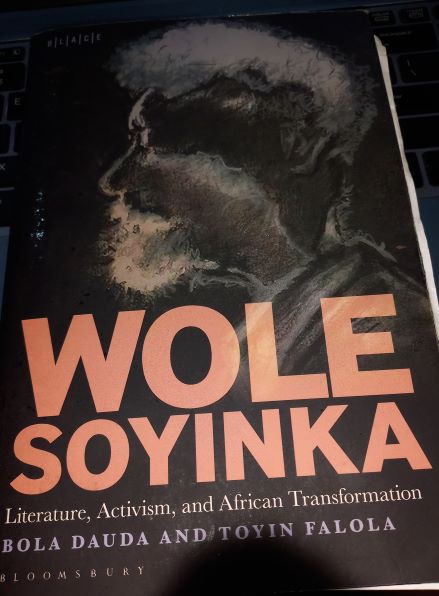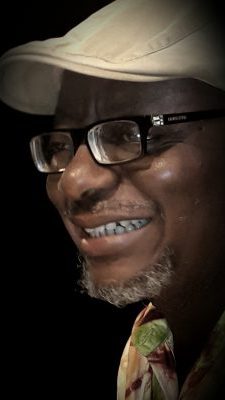Those who respect the elderly pave their own road toward success – African proverb
(Wole Soyinka: Literature, Activism, and African Transformation, Bola Dauda and Toyin Falola, Bloomsbury Academic, New York, 2022)

Any new book on Wole Soyinka, the first African to win the Nobel Prize for Literature, is something many scholars and lovers of the written word look up to. More so when such a book comes from scholars that have in many ways demonstrated excellence and brilliance in their academic endeavours. The book Wole Soyinka; Literature, Activism, and African Transformation, by the duo of Bola Dauda and Toyin Falola falls into this category.
However, the first question that a reader might want to ask is what is the new thing that the duo is going to write that has not been written about by others? A writer of Soyinka’s stature is one that volumes of books have been written about and many still find new areas to explore in his works. It becomes a bit intriguing because what Dauda and Falola try to explore in this book have also been explored in the author’s five memoirs. But that is not to say what they explore here is not worth the candle. Far from that, because the way a writer sees himself is different from the way his readers or others see him.
Broadly divided into four critical areas, the book is a rich cornucopia of study of Soyinka’s rich contributions to the world of literature and humanities. Part one which is the introduction and context deals with studies of the writer and historical understanding of his writing oeuvre. The writers who agree from the beginning that “this work is an unauthorised biography of Wole Soyinka” did not try to dress the book in a borrowed robe. In embarking on this journey, they did a critical examination of works that have been published on Soyinka. In doing this they took a look at many essays by scholars who have dissected his works and took materials and nuggets of information to enrich their own contribution to what the writer is to the world and help in further making his works more accessible and understandable.
Studies and writings by renowned Soyinka scholars such as Tejumola Olaniyan, Biodun Jeyifo, James Gibbs as well as Clara Brodie and Oluwakemi Atanda Ilori set the pace to give the reader what to expect from the book.
The second part takes a look at the writer from a historical perspective; Dauda and Falola take a deep dive into the nature of history and how it shapes people’s lives, views, and actions. They assert that “Soyinka’s global influence can be linked to the timeline of his birth and the environment that nurtured him.” Truly, anyone familiar with the writer’s works would agree with this thesis because the Nobel laureate has been involved in great and critical moments of the country’s history and trajectory. In dealing with this perspective, the duo examines his interventions as a literary soldier, as a compass of Yoruba ontology, as a social engineer, and then his prodigious and prolific creativity which spans all streaks of human creativity.
Coming to Soyinka’s place of birth: Abeokuta, the authors give a good account of the city of birth of one of the world’s most accomplished writers and also complemented it with a rich background history of the stellar Nigerians from all works of life, male and female who hail from the same city with the writer in what they aptly called, “A city of innovations and creativity”, or what else do you call a city that has sired a crop of the elite such as Funmilayo Ransome Kuti, a woman reputed to be the first to drive a car in the country! Or Madam Efunroye Tinubu, Fela Anikulapo-Kuti, Ebenezer Obey and a host of others.
This book is without any doubt well researched and very useful insight into the works and the environments that contributed to making Soyinka what he is today. The duo of Dauda and Falola have through this effort added their own to the body of rich and well-documented works that have come out to interpret Soyinka to his readers and make his work more accessible and understandable.
In concluding the book, they ask whether Soyinka’s work would outlast him. According to them, “Posterity will for a long time remember Wole Soyinka because his works and life have engaged the intractable human issues and essence of humanity. In other words, there are many specialist articles and books on different aspects of Wole Soyinka’s works, life, and politics, but Soyinka has given humanity a classic literary corpus and a lot of biographical materials with which we could portentously conclude that Soyinka’s works will outlive him.” (275).
This is nothing but the truth, the duo has contributed in no small to advancing the frontiers of knowledge and understanding of Soyinka complex world. It is a book that should adorn bookshelves of libraries and institutions where serious intellectual work is done. Kudos to Dauda and Falola for this.
This review is to wish Soyinka who celebrated his 88th birthday on July 13, many more years of service to the arts and justice, which he calls the first condition of humanity.


